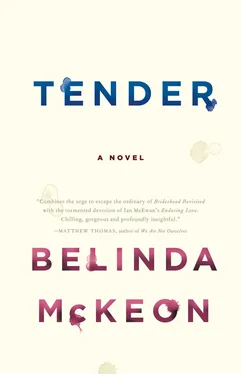They were gone —did she understand that? They were getting on a bus in the morning, and they were gone .
Did she understand that?
Fucking nutcase. Fucking limit .
* * *
(And God help her, what she most wanted to know, in that moment, was whether Liam’s parents knew about Liam and James. Whether Liam had told them. Whether, when they arrived up there for the weekend, would it be as a couple, would James be there as Liam’s boyfriend, and would Liam’s parents have no issue with that? Would Liam’s parents be happy for them to walk around the town, whatever town it was, and for anybody who saw them to see them? And maybe to know?)
(This was what she found herself thinking, as she watched the front door slam.)
(Which meant that he was right, didn’t it?)
(Christ, you were taught and taught well.)
* * *
“Don’t even talk to me,” Lorraine said, when Catherine walked back into the sitting room, shaking, the tears finally, frantically beginning to fall. “Don’t even look at me, Catherine. I can’t believe you. I can’t believe you would try to do that to him. After all that he’s gone through. After all we’ve seen him go through. He’s finally happy, and you try to — you try to — I can’t even understand you. I don’t want to understand you. I have to be honest with you, Catherine, I think you should go. I think you should leave. I don’t think there’s any place for you here anymore.”
( He never said he was happy, was what Catherine thought.)
* * *
And she did not expect that Lorraine would talk to her again.
She expected that the silent treatment she was given that evening, and the next evening, and all of Saturday morning, and into Saturday afternoon — Lorraine and Cillian ignoring her, talking to one another as though she was not there — would continue, and that it would be a full weekend of silence, and a full week of it, and another, until she managed to find another place in which to live—
And she was fine with that. Or she was growing fine with that. She had cried all the tears she had to cry. She had hoped all the hope she was going to bother with. She had no use for it anymore. She needed to leave no room for it. This was not, it turned out, a terrible feeling. This numbness, this emptiness, was not the worst way to feel. She watched a lot of television, and she did not move from the armchair which was farthest from the sitting-room door, so that, if someone came in, she would find herself less tempted to look at them, less naturally inclined—
It was golf on the television all that Saturday afternoon, which she did not understand even in the slightest, but which she let herself watch for hours anyway. Slumped in the armchair for two days. No horoscopes on the Friday; they could do without her, she had decided. She had made a couple of grand out of them, and that would keep her going for a while, that would give her the deposit and the first month’s rent on a new place, and someone else, some other robot, could create lies about how people’s lives were going to turn for them, about how people’s days were going to be—
Her poems; maybe she would go back to her poems now, or maybe— what happens in the heart —maybe, actually, probably not. Something else. Something with a cleaner, blanker kind of slate. Putt again of the golf ball, and murmur of applause from the crowd so genteel that they did not even need a cordon, the crowd who stood there like good boys and girls, trailed the golfers across the course like a sea of chaperones. Putt. And applause. And the sun was streaming hot through the big bay window. And the picture on the television was filtered through its dusty, heavy haze. A red band running around the bottom of the screen now, but Catherine could not make it out, Catherine could not be bothered to squint at it; putt, and applause. Putt, and applause. Walk, and the crowd goes with you — stop, and the crowd stops too—
Then a clatter from the hallway. The clatter of someone tripping on the way from the kitchen, and then, over the clatter, someone calling her name. Someone coming closer; someone up on their feet again, coming towards the sitting room, calling — shouting — Catherine’s name.
Lorraine.
Catherine almost laughed at the sound of her; that didn’t last long, was what she thought. Probably, Lorraine had discovered that all her cigarettes were gone, and had made the assumption that Catherine had helped herself to what was left of hers. But she was wrong, and Catherine looked forward to telling her. Catherine looked forward to—
Lorraine at the sitting-room door now.
“Catherine,” she said again, and Catherine saw; Lorraine had the transistor radio from the kitchen clutched in her hands.
Her voice, when she said Catherine’s name, sounded at once very old and very young.
And her face. It surprised Catherine that faces could actually turn that pale. That they could be so drained; drained of every drop of blood. And yet, still, the freckles as dark as ever; seeming darker, even, and more vivid, even, against the whiteness; spilling across the whiteness like tarnished stars.
And her hands. Her hands, trembling so violently, Catherine saw now, that the radio should surely have fallen. That the radio could not stay—
And in that moment, the radio fell. Bouncing off the carpet; the battery cover knocked off, the batteries spread—
The voices silenced.
“Catherine,” Lorraine said, “Have you heard from James today? Have you heard from Liam?”
Catherine stared. Was this some kind of joke?
“Catherine,” Lorraine said, and now a sob had leapt into her voice, and her hands, which had been hanging, went to her temples, went to her hair. “Catherine,” she said, and she said a sentence that Catherine did not understand. Some of the words she understood, and one of them she could not but understand — it was not a word you could ignore — but another of them, the most important of them, she could not understand; not just what it was, but how it was relevant, how it was relevant to them. Relevant to Lorraine, standing, really crying now, crying ragged, frightened tears in the doorway, the parts of the radio scattered, useless, at her feet; relevant to Catherine, sitting, still half hearing the putt and applause, in her big soft armchair in the afternoon sun. Relevant to James, or relevant to Liam, who were up with Liam’s parents in Enniskillen, or Derry, or wherever it was—
And then Catherine understood the other word.
Ah, a quiet old spot, she heard Liam’s voice saying, from a day when Liam had not yet been Liam.
Except, she had been wrong about that, as well.
“Catherine,” Lorraine was saying now, trying to pull herself together; dragging palms across her streaming eyes, pushing wrists against her streaming nose. Gathering the batteries of the radio, as though that mattered; as though hearing those voices, and the news they were bringing, would change a single thing. “Catherine. We have to do something. We have to—”
But Catherine could only stare.
Because what was it, exactly, that they were meant to do?
What was it that they, two people standing in a sitting room, could possibly do?
James gave the same name to every portrait he took that day.
Untitled
Gelatin Silver Print, 1998
178 x 120cm
Untitled
Gelatin Silver Print, 1998
178 x 120cm
Untitled
Gelatin Silver Print, 1998
178 x 120cm
Untitled
Gelatin Silver Print, 1998
275 x 180cm
Untitled
Читать дальше












